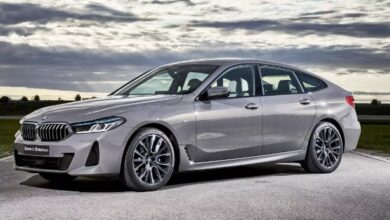What to Know When Buying a Used Car

When it comes to purchasing a used car, there are several essential factors to consider. Buying a used car can be a smart financial decision, but it requires careful research and evaluation to ensure you make the right choice. Whether you’re a first-time buyer or have prior experience with used cars, this comprehensive guide will provide you with valuable insights to make an informed decision. Read on to discover what to know when buying a used car.
Contents
- 1 Why Consider a Used Car?
- 2 Determine Your Budget
- 3 Research, Research, Research
- 4 Decide on the Type of Car
- 5 Find a Trusted Seller
- 6 Get a Pre-Purchase Inspection
- 7 Take a Thorough Test Drive
- 8 Evaluate the Vehicle’s Condition
- 9 Consider Maintenance and Repair Costs
- 10 Review Ownership and Insurance Costs
- 11 Negotiate the Price
- 12 Understand the Terms of the Sale
- 13 Secure Financing (if needed)
- 14 Finalize the Purchase
- 15 Post-Purchase Considerations
- 16 What to Know When Buying a Used Car
- 17 Advantages of Buying a Used Car
- 18 Disadvantages of Buying a Used Car
- 19 Factors to Consider
- 20 Should I Buy a Used Car?
Why Consider a Used Car?
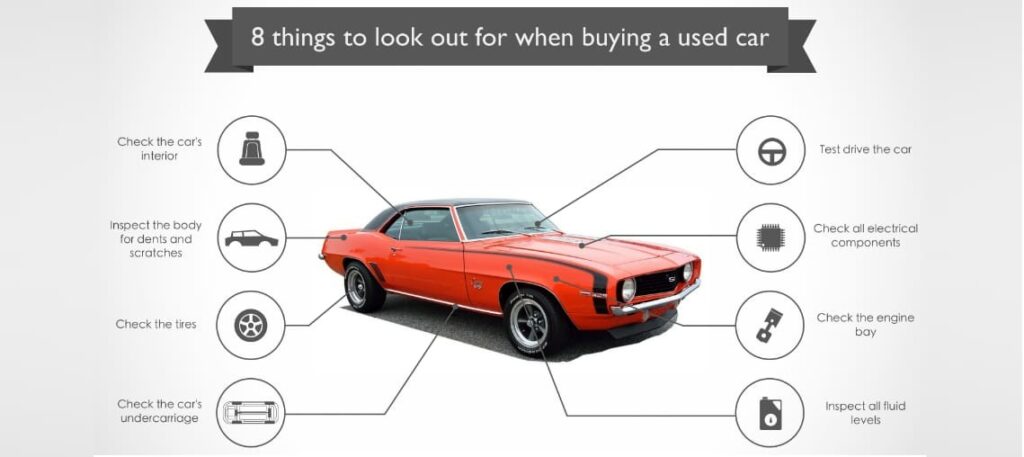
Before delving into the details, let’s explore why buying a used car can be advantageous. The primary benefit of purchasing a used car is its lower price compared to a brand-new vehicle. Used cars tend to have a lower depreciation rate, meaning you can potentially save a significant amount of money. Additionally, buying used allows you to afford a higher-end model or a car with additional features that may be out of your budget if purchased new.
Determine Your Budget
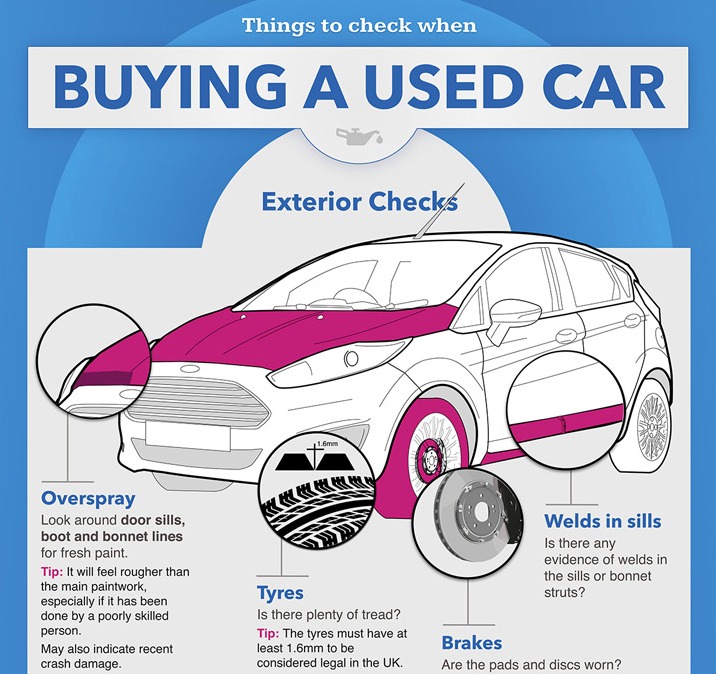
Establishing a budget is crucial when buying a used car. Consider your financial situation and determine how much you can comfortably spend on a vehicle. Remember to account for additional costs such as insurance, registration, maintenance, and fuel. Once you have a clear budget in mind, stick to it to avoid overspending.
Research, Research, Research
Before visiting dealerships or exploring online listings, conduct thorough research on the make and model of the used car you’re interested in. Look for reviews from reputable sources to gain insights into the car’s reliability, performance, and common issues. Check the car’s history report using its vehicle identification number (VIN) to ensure there are no major accidents, flood damage, or other red flags.
Decide on the Type of Car
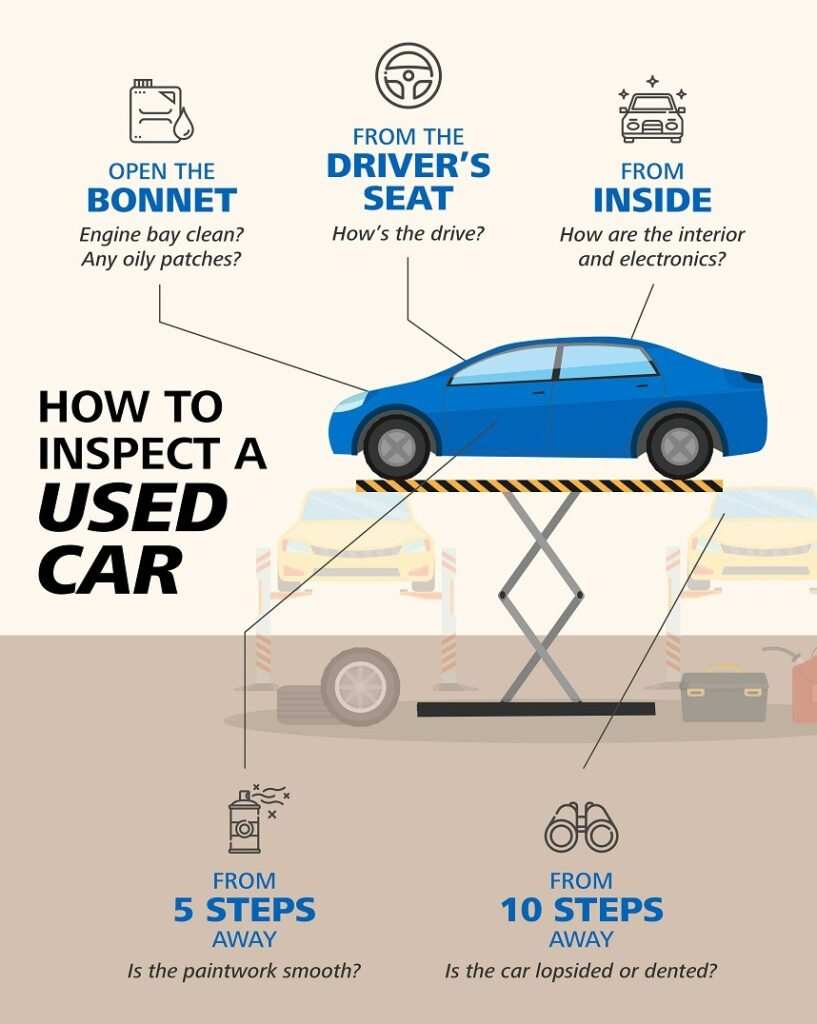
Consider your needs and lifestyle when choosing the type of car you want to buy. Are you looking for a compact car for city driving or an SUV for family trips? Do you prioritize fuel efficiency or cargo space? By identifying your specific requirements, you can narrow down your options and focus on finding the right used car that suits your needs.
Find a Trusted Seller
When buying a used car, it’s crucial to find a trustworthy seller. Research local dealerships with a good reputation or consider buying directly from a private seller. Each option has its pros and cons, so weigh them carefully. Dealerships often offer certified pre-owned vehicles with warranties, while private sellers may provide more negotiable prices. Whichever route you choose, make sure to thoroughly inspect the car and verify its documentation.
Get a Pre-Purchase Inspection
Before finalizing the purchase, it’s essential to have the used car inspected by a qualified mechanic. A pre-purchase inspection can uncover hidden issues or potential problems that may not be apparent during a test drive. The mechanic will assess the car’s mechanical condition, check for any signs of previous damage or repairs, and provide you with an overall assessment of the vehicle’s health.
Take a Thorough Test Drive
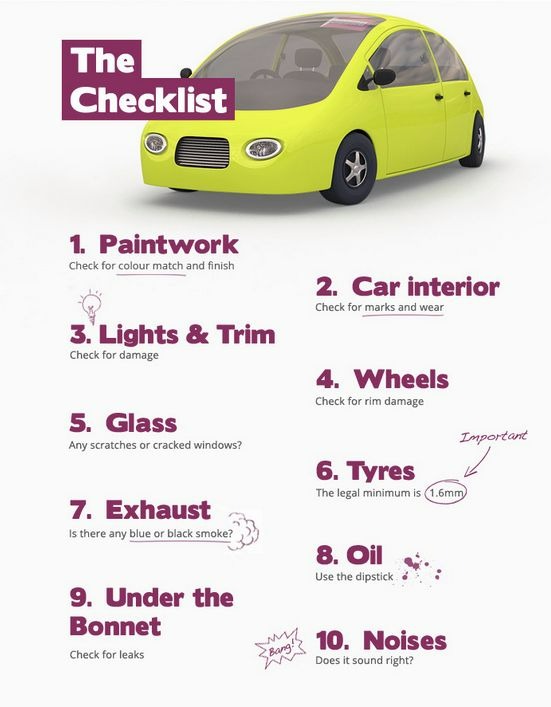
A test drive is an opportunity to evaluate the car’s performance and comfort firsthand. During the test drive, pay attention to the engine’s responsiveness, braking system, steering, and overall driving experience. Test the car in various conditions, such as on highways and in stop-and-go traffic, to ensure it meets your expectations. Don’t hesitate to ask the seller questions or request additional time for a more extensive test drive.
Evaluate the Vehicle’s Condition
Carefully examine the used car’s exterior and interior to assess its overall condition. Check for any signs of rust, dents, or scratches on the body. Inspect the tires for wear and tear, ensuring they have sufficient tread depth. Inside the car, inspect the seats, dashboard, and controls for any damage or malfunctioning features. Don’t forget to test the lights, air conditioning,heating system, and other electronic components to ensure they are in working order.
Consider Maintenance and Repair Costs

Before making a purchase, it’s essential to consider the potential maintenance and repair costs associated with the used car. Research the car’s average repair costs, availability of spare parts, and the frequency of common issues. Some models may have higher maintenance expenses or require specialized parts, so factor these considerations into your decision-making process.
Review Ownership and Insurance Costs
Another aspect to keep in mind when buying a used car is the ownership and insurance costs. Check the car’s fuel efficiency to estimate your monthly fuel expenses. Additionally, contact insurance providers to obtain quotes for the specific make and model you’re interested in. Insurance premiums can vary significantly based on the car’s age, safety features, and previous insurance history.
Negotiate the Price
One advantage of buying a used car is the potential for negotiation. Research the market value of the car you’re interested in to have a baseline for negotiation. Take into account factors such as mileage, overall condition, and any additional features or modifications. Be prepared to negotiate with the seller, whether it’s a dealership or a private individual, to ensure you get the best possible price.
Understand the Terms of the Sale
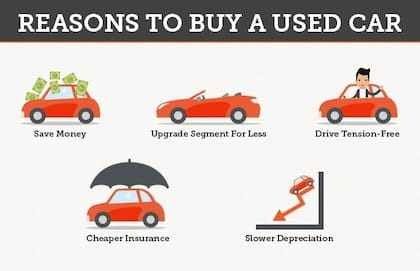
Before signing any documents or making a payment, thoroughly review and understand the terms of the sale. Pay attention to warranty information, return policies, and any additional fees or charges. If purchasing from a private seller, ensure that the necessary paperwork, such as the title transfer and vehicle registration, is in order. Clarify any doubts or concerns you may have with the seller before proceeding.
Secure Financing (if needed)
If you require financing to purchase the used car, explore your options before visiting the seller. Contact banks, credit unions, or online lenders to compare interest rates and loan terms. Pre-approval for a loan can provide you with a clear budget and strengthen your negotiating position. However, be mindful of the interest rates and loan duration to ensure you don’t overextend your finances.
Finalize the Purchase
Once you have conducted thorough research, inspected the car, negotiated the price, and reviewed the terms of the sale, you can proceed with finalizing the purchase. Ensure that all necessary paperwork is completed accurately and keep copies for your records. Make the payment using a secure method, such as a certified check or bank transfer, and obtain a receipt or proof of purchase.
Post-Purchase Considerations
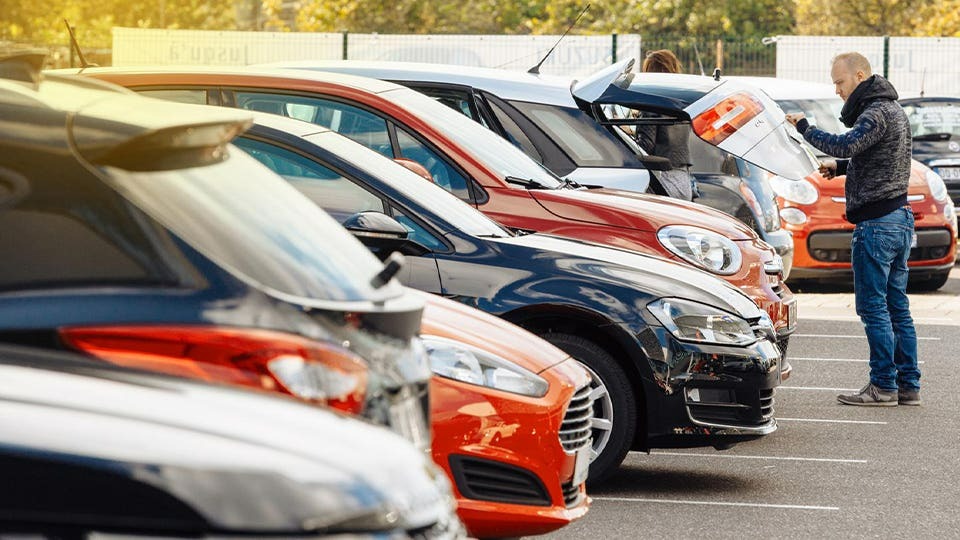
After buying a used car, there are a few additional steps to take to ensure a smooth ownership experience. Transfer the vehicle’s title and registration to your name within the designated timeframe mandated by your local authorities. Additionally, consider investing in an extended warranty or vehicle service contract for added peace of mind.
What to Know When Buying a Used Car
Purchasing a used car requires careful consideration and attention to detail. By following the steps outlined in this guide, you can navigate the process confidently and make an informed decision. Remember to research thoroughly, inspect the car, negotiate the price, and review all terms of the sale before finalizing your purchase. With these precautions in place, you’ll be well-equipped to find a reliable used car that meets your needs and fits your budget.
*Note: The article has been written based on general knowledge and research up until September 2021. It is always recommended to consult with professionals and stay updated on the latest information when buying a used car.
Advantages of Buying a Used Car

1. Cost Savings
One of the most significant advantages of purchasing a used car is the cost savings. Used cars are generally much cheaper compared to their brand-new counterparts. As soon as a new car is driven off the lot, its value depreciates significantly. By buying used, you can avoid the initial depreciation and potentially save thousands of dollars.
2. Lower Insurance Premiums
Another financial advantage of buying a used car is the potential for lower insurance premiums. Insurance companies typically base their rates on the value of the vehicle, and since used cars have a lower market value, your insurance costs may be more affordable. Additionally, used cars may have lower registration fees and taxes, further reducing your overall expenses.
3. Avoiding Depreciation
New cars depreciate the most within the first few years of ownership. By purchasing a used car, someone else has already absorbed the bulk of the depreciation. This means that when it comes time to sell the car, you may be able to recoup a larger percentage of your initial investment compared to a new car.
4. Wider Variety of Options
When buying used, you have a broader range of options available to you. You can choose from different makes, models, and years, allowing you to find a vehicle that suits your preferences and budget. Whether you’re looking for a specific feature or a particular brand, the used car market offers a diverse selection.
5. Lower Risk
Modern cars are built to last longer and are more reliable than ever before. By purchasing a used car, you can benefit from the years of research and improvements that have been made. Many used cars come with detailed maintenance records, allowing you to assess their service history and make an informed decision. Additionally, online resources and vehicle history reports can provide valuable insights into the condition of the vehicle.
Disadvantages of Buying a Used Car
1. Higher Maintenance Costs
Used cars, especially those with higher mileage, may require more frequent repairs and maintenance. As a vehicle ages, components may start to wear out or malfunction, leading to additional expenses. It’s important to factor in potential maintenance costs when considering the purchase of a used car.
2. Limited or No Warranty Coverage
Unlike new cars that often come with manufacturer warranties, used cars may not have any remaining warranty coverage. While some used cars may still have an existing warranty, it is typically shorter in duration and may have certain limitations. Without warranty protection, you may be responsible for covering the costs of any repairs or replacements that arise.
3. Unknown Vehicle History
When buying a used car, you may not have a complete picture of its history. While vehicle history reports can provide some insights, they may not capture every detail. It’s essential to thoroughly inspect the car, conduct a test drive, and consider hiring a trusted mechanic to perform an inspection before making a purchase. This will help uncover any potential issues that could affect the vehicle’s performance and reliability.
4. Limited Customization Options
When purchasing a used car, you may have limited options for customization. Unlike ordering a new car with specific features and options, a used car comes as-is. While you can make some modifications after purchase, you may not have the same level ofcustomization flexibility as you would with a new car.
5. Potential Higher Fuel and Maintenance Costs
Older used cars may have lower fuel efficiency compared to newer models. Advancements in technology have led to more fuel-efficient vehicles, meaning that older used cars may consume more fuel per mile. Additionally, as a car ages, it may require more frequent maintenance, such as replacing worn-out parts or addressing mechanical issues. These additional costs should be considered when weighing the decision to buy a used car.
Factors to Consider
Now that we have explored the advantages and disadvantages of buying a used car, let’s discuss some important factors to consider when making your decision.
1. Budget
Your budget will play a significant role in determining whether buying a used car is the right choice for you. Consider how much you can afford to spend on a vehicle and evaluate whether a used car fits within your financial means. Remember to factor in ongoing expenses such as insurance, maintenance, and fuel costs.
2. Purpose and Needs
Think about your specific needs and the purpose of the vehicle. Are you looking for a reliable daily commuter, a spacious family car, or a sporty vehicle for weekend adventures? Assessing your requirements will help you narrow down your options and make an informed decision about the type of used car that best suits your lifestyle.
3. Research and Inspection
Before purchasing a used car, do thorough research on the make, model, and year you are interested in. Look for common issues or recalls associated with that particular vehicle. Once you have identified a potential car, schedule a test drive and conduct a detailed inspection. Check the exterior, interior, engine, and tires for any signs of damage or wear. Don’t hesitate to ask questions and request maintenance records.
4. Vehicle History Report
Obtaining a vehicle history report is essential when buying a used car. This report provides valuable information about the car’s past, including accidents, title status, mileage, and service records. It can help you identify red flags and make an informed decision about the vehicle’s condition and reliability.
5. Consider Certified Pre-Owned (CPO) Cars
If you are concerned about the potential risks associated with buying a used car, consider exploring certified pre-owned (CPO) vehicles. CPO cars undergo a rigorous inspection and refurbishment process conducted by the manufacturer or authorized dealer. They often come with extended warranties and additional benefits, providing you with peace of mind and some of the advantages of purchasing a new car.
Should I Buy a Used Car?

In conclusion, the decision of whether to buy a used car ultimately depends on your individual circumstances, preferences, and budget. While there are undeniable advantages such as cost savings, wider variety, and lower depreciation, it’s important to consider potential drawbacks like higher maintenance costs and limited customization options.
By thoroughly researching, inspecting, and considering the factors discussed in this article, you can make an informed decision and determine whether buying a used car is the right choice for you. Remember, a well-informed choice is the key to finding a reliable and suitable used car that meets your needs and provides value for your money. So, should you buy a used car? Only you can answer that question based on your unique situation and priorities.
https://www.facebook.com/Topcarintheworld2

